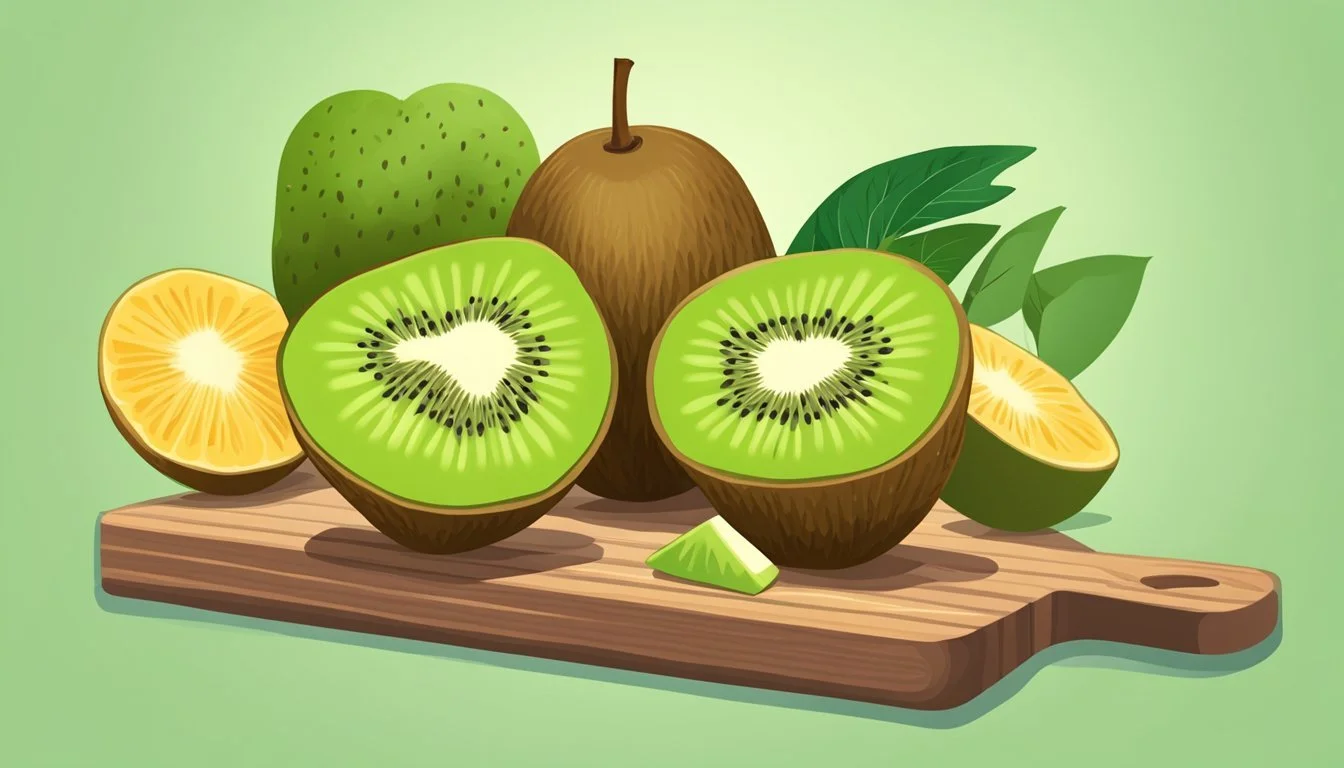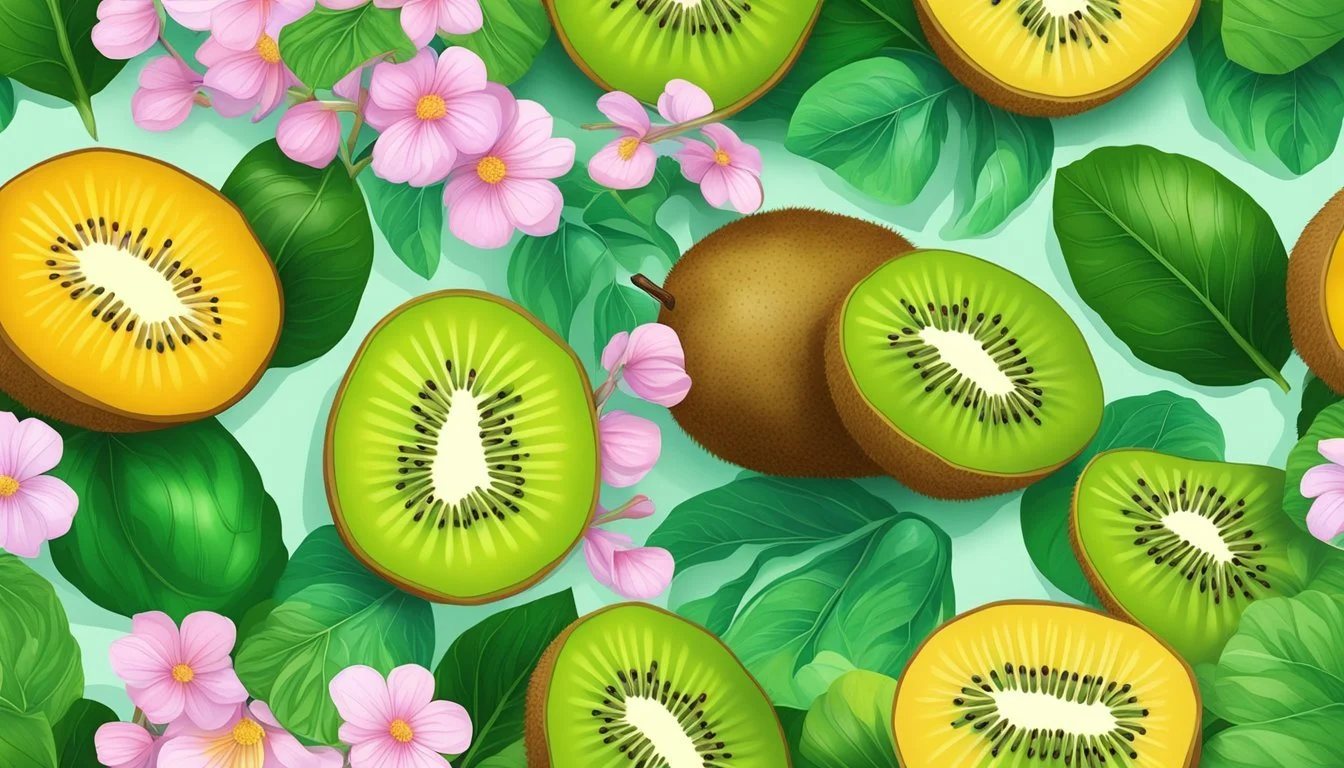What Are the Health Benefits of Kiwi?
Uncovering Nutritional Advantages
The kiwi fruit, often simply called a kiwi, is recognized for its distinctive green flesh speckled with tiny black seeds and a fuzzy brown exterior. This small fruit packs a nutritional punch, renowned for its rich composition of vitamins and antioxidants that offer a range of health benefits. Kiwis are particularly noted for their high vitamin C content, surpassing that of oranges, and thus play a significant role in bolstering the immune system.
Beyond immune support, the nutritional profile of kiwis extends to improving digestive health, due largely to their fiber content. Fiber aids in maintaining a healthy digestive tract by promoting regular bowel movements and may alleviate constipation. Additionally, the fruit is a good source of potassium, which is pivotal for maintaining cardiovascular health. It helps balance electrolytes and counteracts the effects of sodium, aiding in blood pressure regulation.
These health benefits make kiwis an excellent addition to a balanced diet. Their valuable nutritional contribution, including a range of vitamins, antioxidants, and minerals, promotes overall wellbeing when consumed as part of a healthy lifestyle. As a low calorie and nutrient-dense food, kiwis can be a smart choice for those looking to enrich their diet with essential nutrients while managing calorie intake.
Nutritional Profile of Kiwi
The kiwi fruit stands out for its exceptional vitamin and mineral content as well as its rich fiber provision, making it a highly nutritious addition to the diet.
Vitamins and Minerals in Kiwi
Kiwi is an excellent source of several essential vitamins and minerals. Notably, it is an abundant provider of vitamin C, one key antioxidant that supports immune function and skin health. Just one medium-sized kiwi supplies over 100% of the daily recommended intake of vitamin C. Kiwis also offer a good variety of minerals, including potassium, which is vital for maintaining healthy blood pressure levels, as well as magnesium and calcium, which are important for bone health and metabolic functions. Other important nutrients found in kiwi include:
Vitamin E: An antioxidant important for skin and immune health
Vitamin K: For blood clotting and bone metabolism
Folate: Essential for cell division and making DNA
Iron: Crucial for oxygen transport in the blood
Macronutrients and Fiber
In terms of macronutrients, kiwi provides a balanced mix that contributes to its overall health benefits. Kiwis are low in calories, with a medium-sized fruit containing roughly 42 calories. The macronutrients in a kiwi are approximately as follows:
Carbohydrates: About 10 grams, mainly from natural sugars and dietary fiber
Protein: Roughly 0.8 grams, which is modest but beneficial
Fats: Minimal amounts, generally around 0.4 grams
The fiber in kiwi is notable both in quantity and quality. A 100-gram serving contains about 3 grams of dietary fiber, which aids in digestion and promotes satiety. This fiber includes both soluble and insoluble forms, supporting gut health and regular bowel movements.
Health Benefits of Kiwi Consumption
Consuming kiwi is beneficial for various aspects of health, including improvement of heart function, digestive wellness, skin condition, and bolstering the immune system. Each area gains specific advantages from the nutrients found in kiwi fruit.
Heart Health
Kiwi contains properties that are associated with the protection of cardiovascular health. They are a natural source of potassium, which is crucial for keeping the blood pressure levels in check. Additionally, the fruit is rich in antioxidants, which help in combating the destructive effects of free radicals and aid in reducing the risk of heart conditions. Kiwi also contains fiber, which has been shown to help manage cholesterol levels, thus preventing the buildup of plaque in the arteries.
Digestive Wellness
The fruit is known for its high fiber content, which aids in digestion and can help alleviate constipation by adding bulk to the stool. Kiwi also contains an enzyme known as actinidin, which facilitates the breakdown of proteins, further aiding the digestive process. This makes kiwi an excellent choice for maintaining digestive wellness.
Skin Vitality
Kiwi is beneficial for the skin due to its high Vitamin C content. This important vitamin contributes to collagen production within the body, which enhances the skin’s elasticity and firmness, promoting skin vitality. The antioxidants in kiwi also play a role in protecting the skin from damage caused by UV light and pollution.
Immune System Support
A single kiwi fruit can provide a substantial amount of the recommended daily intake of Vitamin C, which is vital for the strength of the immune system. It supports various cellular functions of both the innate and adaptive immune systems. Regular intake of kiwi may help in maintaining a robust immune defense against pathogens.
Kiwi in the Diet
Integrating kiwi into one's diet can enhance nutritional intake, particularly due to its rich vitamin and dietary fiber content. This fruit can easily be incorporated into a variety of meals, though one should be aware of potential allergic reactions.
Incorporating Kiwi into Meals
Kiwi can seamlessly complement a broad array of dishes with its unique sweet-tart flavor. Breakfast options can include slices of kiwi added to yogurt or mixed into a fruit salad, offering a morning boost of vitamin C. For a nutritious snack, blending kiwi into a smoothie is both effortless and satisfying. It provides not only a refreshing taste but also a significant amount of dietary fiber, which can aid digestion.
Here's a simple breakdown for snack ideas:
Fruit salads: Combine kiwi with other fruits like berries, oranges, and bananas for a vitamin-rich dish.
Smoothies: Blend kiwis with other fruits, a choice of milk or juice, and perhaps a scoop of protein powder for an energy boosting drink.
Topping for yogurt: Add sliced kiwi to plain or flavored yogurt to enhance your snack with added taste and nutrition.
Potential Allergies and Considerations
When introducing kiwi into the diet, it is important to note that some individuals may experience kiwi allergies. Symptoms of a kiwi allergy can include itching or swelling in the mouth and lips immediately after consumption. Individuals who have a sensitivity to latex or similar fruits may have a higher risk of developing an allergy to kiwi. For those without allergies, kiwi is a low-calorie fruit that provides essential nutrients without large amounts of carbohydrates or sugars. However, as with all foods, it should be consumed in moderation to maintain a balanced diet.
Origins and Varieties of Kiwi
The kiwi, originally known as the Chinese gooseberry, hails from China. It was later introduced to New Zealand, where it gained the name "kiwi" after the country's iconic bird. Now, New Zealand is synonymous with kiwi cultivation and is a major producer of the fruit.
Kiwi belongs to the genus Actinidia, which includes multiple species, but the most commonly consumed are the green and golden varieties.
Predominant variety worldwide
Oval-shaped with brown, fuzzy skin
Bright green flesh with tiny black seeds
Tangy-sweet flavor
Golden Kiwi:
Smooth, bronze skin
Yellow flesh and a sweeter taste
Less acidic than the green variety
The fruit is not only a culinary favorite but also an agricultural asset. Each variety contributes to the diversity of flavors and benefits found in kiwis. Here's a comparison in tabular form:
Green Kiwi: Brown, fuzzy skin; Green flesh; Tangy-sweet flavor
Golden Kiwi: Bronze, smooth skin; Yellow flesh; Sweeter, tropical flavor
Cultivators have experimented with crossbreeding different species within the Actinidia genus to develop new varieties that boast unique flavors and characteristics.
The growth of kiwis has spread beyond China and New Zealand to other countries, contributing to the global fruit market and enhancing the variety of kiwis available to consumers. As a result, kiwi fruits are enjoyed worldwide for their taste and nutritional benefits, solidifying their position as a globally recognized and valued fruit.
Frequently Asked Questions
In this section, readers will find answers to common inquiries about the various health benefits and considerations associated with kiwi consumption. Each question is carefully addressed based on current knowledge.
How can consuming kiwi fruit benefit skin health?
Kiwi fruit, rich in vitamin C and antioxidants, can contribute to the health of one's skin by aiding in collagen production and combating free radical damage.
What positive effects do kiwis have on women's health?
For women, kiwis offer a wealth of nutrients like folate, which is essential for fetal development during pregnancy, and fiber which supports digestive health.
Can eating kiwi impact sexual health, and if so, how?
The vitamin C content in kiwi may support blood circulation, which is beneficial for sexual health, enhancing endovascular function and potentially increasing libido.
What are the potential risks associated with consuming kiwi?
Kiwi may pose risks for individuals with a kiwi allergy, resulting in reactions ranging from mild oral irritation to more severe symptoms like anaphylaxis.
Are there health advantages to eating kiwi on a daily basis?
Eating kiwi regularly can support immune function due to its high vitamin C content, and its dietary fiber can contribute to positive digestive health.
In what ways does kiwi fruit contribute to overall wellness?
Kiwi contributes to whole-body wellness by providing essential vitamins and minerals, aiding immune function, supporting heart health, and facilitating digestive regularity.




